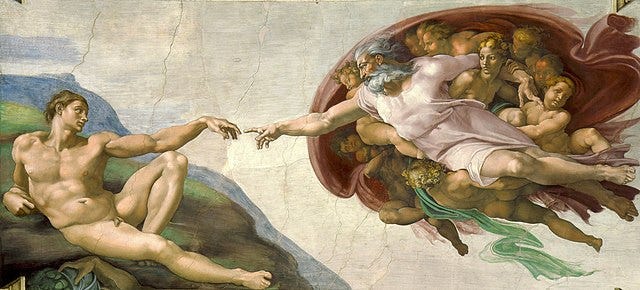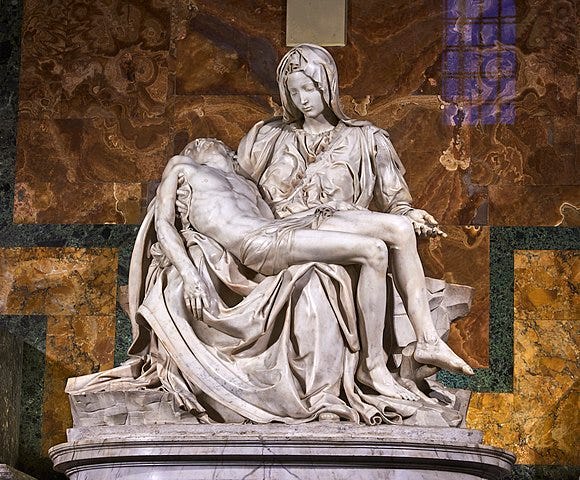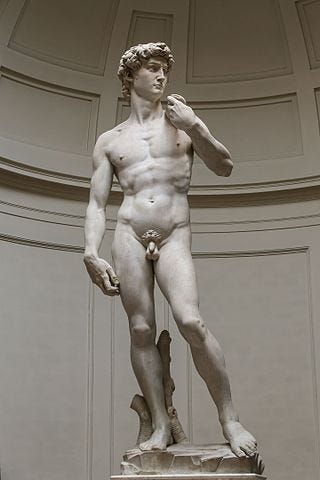I was a Christian until I read the Bible and that's when I could finally appreciate it
Course in Humanities: Fortnight #9
Today I’m sharing my thoughts on the ninth fortnight of our adapted version of Ted Gioia’s Course in Humanities.
You can find previous parts of this course at the end of this post.
For now, we’ll discuss:
a) Michelangelo: Sistine Chapel and sculptures.
b) William Byrd’s choral music and The Byrd’s “Turn, Turn, Turn”; Thomas Tallis’ Lamentations of Jeremiah; Handel’s Messiah.
c) Genesis, Ecclesiastes, the Four Gospels and Epistle to the Romans.
Michelangelo

Michelangelo di Lodovico Buonarroti Simoni (1475 – 1564), best known as Michelangelo1, was one of the most (if not the most) successful artists of the High Renaissance2, working as a sculptor, painter, architect and writer.
His career was long (more than sixty years) and mostly divided between Florence, in service of the town and the Medici, and Rome, in service of the papacy. He was influenced by classical antiquity, both in style and subject matter. Many of his pieces also draw inspiration from the Bible and catholic background.
His sculptures marvelled, and continue to marvel, the viewers for their highly detailed, superhuman beauty and excellence. The same can be said about his paintings, even though he considered himself a sculptor.
Michelangelo’s most famous works are Pietà (1498–1499), David (1501–1504), the Sistine Chapel ceiling (1508–1512) and The Last Judgment (1536–1541).

I hope to see his work in person one day — Italy is on my bucket list because of its art and architecture (and food).
Music
I did not enjoy this music assignment.
Don’t get me wrong, the songs aren’t bad, it’s just that the albums were repetitive and long. It was like listening to a church choral that never ends.
The exception was Tallis’ Lamentations of Jeremiah.
One the voices in the recording I listened to reminded me of the boy who sings when Gandalf rescues Faramir and riders of Gondor from the Nazgûl in Return of King, which is always nice to think about.
Bible
I almost didn’t do the reading assignment for this fortnight.
I had a really busy week and found myself exhausted — not exactly conducive to rereading books I’ve already read several times.
I grew up as a Christian and my faith, with a push from my endless curiosity, led me to study the Bible extensively. After a few years tormenting myself, I finally acknowledged I didn't agree with or believe in a lot of what was written there.
I could have remained introducing myself as a Christian, kept going to church and maintained my social circle undisturbed, but it would have made me a hypocrite. A Christian is someone who, at least in theory, follows the example set by Christ3 and I had no plans to live like that.
But enough about me. The course is the course. Let’s move on to the reading.
The Bible is a collection of religious texts written (and rewritten) by multiple people between the 6th century BCE and the 2nd century CE.
The ancestors of modern-day Jews believed in many gods, just like everyone else in the ancient Levant.
The people who lived in the north (in an area later identified as the kingdom of Israel) tended to favor the god El (other title: Elohim), who, along with his wife Asherah, headed a pantheon that included many other deities, such as Baal, Astarte and the war god Yahweh (El’s son, largely worshiped in the kingdom of Judah).
Israel was conquered by the Babylonians and many of its people (and myths) fled south. Eventually Judah rebelled and was defeated by the Babylonians as well.
The Jews living in exile clung to their faith and, instead of saying the gods of Babylon beat their gods, they decided to (re)write their history, blaming themselves for their own collapse — Yahweh did not fail, he temporary “abandoned” them because of their infidelity.
That’s when the oldest books in Bible started to be written, based on rationalized myths, fears and hopes of a defeated people.
The dominant narrative came from Judah (Jerusalem), but tales from Israel were incorporated and El was merged with/replaced by Yahweh as the god of the alliance. After a while, Yahweh went from being the only god officially accepted by the ruling class of the jewish people to becoming the only god whose existence was recognized by them.
Fast forward hundreds of years, a messianic figure shows up and, perhaps unintentionally, starts a new religion, being adored by Christians as the son of Yahweh/El and leading to a whole new wave of scriptures.4
For Genesis and Ecclesiastes, I picked the Jewish Publication Society (JPS) Tanakh. Name variations and translation aside5, it was exactly what I expected it to be.
This time, however, my focus was on comparing the mythology and creation story with other myths from the same area and rolling my eyes at all lying, backstabbing and drama involving one of the most famous families in “history” (there is little to no history or historical figures in the early books of the Bible).
Turns out I’m more of Uta-napishtim than Noah or Deucalion kind of girl.
I know a lot people find Ecclesiastes a bit depressing, but King Solomon sounds like a realist to me. Knowledge is great, liberating even, but ignorance is bliss.
For the New Testament, I read the New Revised Standard Version Catholic Edition (with notes for text varations).
I understand why the Gospels are such game changers in Western culture. However, once you stop trying to find “answers” in them, they mostly entertain academic discourse.
Leaving aside theological or philosophical questions, and appreciating the text for its literary value, I must to say I wish they made Jesus more appealing as a protagonist. He is just too “perfect” and preachy — the most relatable moment is when he gets angry or lashes out at the pharisees, which seems a bit contradictory considering all things the disciples allegedly wrote about him.
I would have liked it better if they had written his story as an epic poem (they certainly had enough material for it), but I guess that would defeat the whole witness/testimony purpose they had going on.
The structure could also use a bit of improvement to make things flow smoothly and chronologically. There are a times when you catch yourself wondering which episode or speech came first. When it comes to discrepancies, I thought they were natural considering each Gospel is a different version of myths and legends.
Nevertheless, Jesus isn't nearly as frustrating as Paul.
Romans is the longest and one of the most palatable of his epistles. It’s not something I would could call direct or succinct, but, in a nutshell, it explains the gift salvation through faith (and works) in Jesus Christ.
Paul discourses about the Gospel and how one, Jew or Gentile, should conduct themselves in light of their new relationship with God, which is available to all who believe in him thanks to the sacrifice made by his son.
There is some debate regarding the authorship of the letters attributed to Paul.
Since we don’t really know who wrote most of the books in the Bible, plus the fact that they were edited many times over the years and selected by a bunch of men who had nothing to do with the time and place in which the stories supposedly happened, I don’t see the point in discussing the matter here.
I read these books for historical value, so it doesn’t really matter who wrote them, just the impact they had.
This is it for today.
I hope you’ll join me for next fortnight.
In case you haven’t read them, here are parts One, Two, Three, Four, Five, Six, Seven and Eight.
Like many other italian masters known by only one name (Leonardo, Artemisia, Raphael etc.).
People were so impressed by his work they often called him Il Divino ("the divine one"). He has also done his fair share for the publishing industry throughout the centuries — several biographies and books about Michelangelo and his work came out during his lifetime and countless more after he died.
I say “in theory” because behaving or trying to behave like he is described doing in the Bible seems to be optional in religious circles.
A similar (not identical) process happens a few centuries later with Mohamed and Muslims.
I had only read portuguese translations of text, so it was a bit weird at first, but I quickly got used to it






Fascinating article. Went down a rabbit hole about early Judaism. 🙏